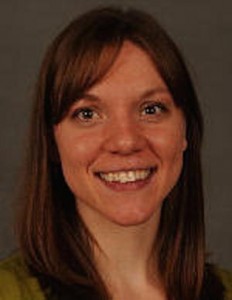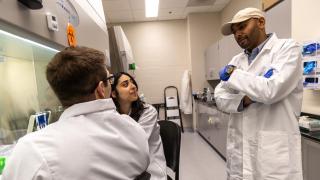

In between teaching classes, Whitehead, assistant professor of psychology, spends her days in UM-Dearborn’s Aging Well Lab and conducting research looking at aging and how factors like stress and attitude affect the process.
But her interest in the aging process started when the then 20-year-old worked with older individuals while conducting a life satisfaction survey that compared her fellow undergraduate college students and senior citizens. She appreciated the enthusiasm, candor and interest that the latter showed.
“The college students would complain, but the older folks were engaged and active participants. They wanted to do whatever they could to contribute to research that might help down the line,” she said. “I enjoyed talking with them and hearing their stories. It was very refreshing. You realize that they were once 22 too. And that you are going to get older.”
With a growing population of seniors and increasing life spans, Whitehead wants to find answers on how to best preserve health and enjoy those golden years.
According to the U.S. Census Bureau, it’s anticipated that Americans aged 65 or older will number nearly 89 million people by 2050, or more than double the number of older adults in the United States in 2010.
“We have better nutrition, better education and medical intervention. But the longer life span happened so quickly people aren’t aware of issues that come along with that,” she said, citing physical limitations and smaller social circles.
Whitehead said it’s good news that we are living longer—if a quality of life can be maintained.
“Quantity of life is one thing, but quality of life is another. It’s key. If you are going to live longer, they should be good years,” she said. “But, for many, the last five to 10 years is spent in poor health or in social isolation. So the goal here is looking for ways to improve the quality of life.”
In the campus’ Aging Well Lab, Whitehead currently meets with 150 individuals, ages 60 to 98. (The average age is 78.) She’s been following the same group for two years, with the goal of gaining five years of information.
Participants take questionnaires, write a daily journal of activities, and come into the lab for interviews and health assessments, with the goal of measuring objective and perceived health, positive and negative affect, attitude toward aging and health behaviors.
Whitehead said this research is looking at how certain behaviors may predict quality of life as people age. She looks at things like seatbelt use, flossing, hygiene, exercise and nutrition.
Whitehead said the preliminary results from the first survey indicate that seniors are more likely to engage in health behaviors—things like taking walks or eating vegetables—when they perceive themselves to be healthier and have a more positive outlook on life.
Findings can be used to provide a guideline for developing programs or interventions aimed at encouraging seniors to stay positive, she said.
“We want to live a long life, and that means aging,” Whitehead said. “It’s important to make the most of the time we have, realize that there are gains that come with aging, and encourage others to do the same.”




